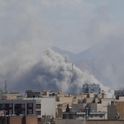While the UK press is obsessing over who will replace Boris Johnson, developments in Ukraine are causing headaches for all. The Russian ambassador to the UK warned in a BBC interview this week that Russia had not yet made use of its own panoply of potential sanctions in retaliation for western measures—comments interpreted by many to mean that it is actively considering a gas blockade.
Germany, which depended on Russia for 54 per cent of its gas imports before the war started, particularly fears that possibility. The German government is reportedly considering emergency measures such as effectively nationalising energy companies, re-opening coal plants and rationing oil and gas, with industry being favoured to receive the supplies of energy it needs even at the expense of households. This response was partly triggered by a 60 per cent drop in June in the flow of gas through the Nord Stream 1 pipeline under the Baltic Sea. Gas prices in many countries in Europe have more than doubled in the last month. The pipeline is now undergoing routine maintenance work and anxious observers worry when the flow will restart.
It is in this context that we see some concessions being made by the EU and others who are trying to avoid a further deterioration of relations with Russia. One such concession is the EU’s agreement, despite some opposition from member states bordering Russia, to allow Canada to return to Germany a turbine required for the Nord Stream maintenance work—apparently in contravention of existing sanctions. Another is the European Commission’s clarification—some would say softening—of the sanctions on goods exports from Russia. This will allow the flow of trade between Russia and Kaliningrad, a Russian enclave with no land border with the country, to resume, after it was halted by Lithuania (through which the transit would flow). And another is the west’s effort, using Turkey and the UN as intermediaries, to broker a deal between Russia and Ukraine to facilitate the export of grain and other foodstuffs from Ukrainian ports. This blockade has been in place for some time now, creating severe food shortages across the world and pushing prices up to unaffordable levels for many developing countries. The parties seem to have now struck an agreement in principle to end the standoff.
Some de-escalation of tensions will at least give countries like Germany, which are trying to boost their gas reserves in time for winter, some room to prepare for the possibility of a permanent drop—or even complete blockage—of gas from Russia. The Bundesbank has estimated that German GDP would fall by some 3 per cent in 2023 if Russian energy supplies were cut off (other forecasters think the drop could be even higher). This outcome would have serious repercussions for the country's manufacturing sector.
While Russia made just under $100bn from sales of oil and gas in the first 100 days of the war, and has made plenty more since, the cost to Europe in the short term is already being felt. Inflation in Lithuania in June was over 20 per cent, with the other Baltic states only a bit behind. Worries about recession in the event of a gas blockade have helped to push the euro to parity against the dollar for the first time in two decades. The Baltic states have already stopped importing Russian gas anyway, and Gazprom has recently imposed new restrictions on supplies to places like the Netherlands and Denmark.
For the UK, whatever happens to oil and gas prices will be an extra headache for Johnson's successor. By the time they take over running the country, likely in early September, they will have to deal with a cost of living crisis which if anything will have worsened.












